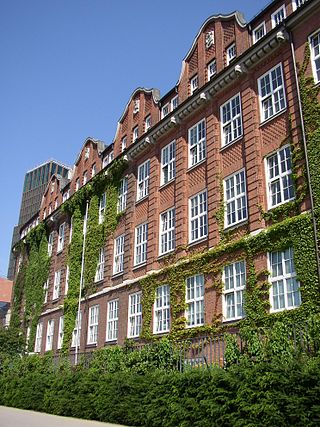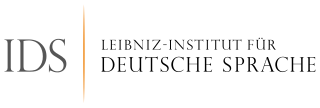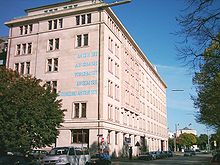The Helmholtz Association of German Research Centres is the largest scientific organisation in Germany. It is a union of 18 scientific-technical and biological-medical research centers. The official mission of the Association is "solving the grand challenges of science, society and industry". Scientists at Helmholtz therefore focus research on complex systems which affect human life and the environment. The namesake of the association is the German physiologist and physicist Hermann von Helmholtz.

Edelgard Bulmahn is a German politician from the Social Democratic Party of Germany (SPD). She served as Member of the German Bundestag between 1987 and 2017. She was Federal Minister of Education and Research from 1998 to 2005. From 2013 until 2017 she was elected as one of the Vice Presidents of the Bundestag.

Bernhard Nocht Institute for Tropical Medicine (BNITM) in Hamburg is Germany's largest institution for tropical medicine, with a workforce of about 250 people in Hamburg. It is member of the Leibniz-Association.

The Kiel Institute for the World Economy is an independent, non-profit economic research institute and think tank based in Kiel, Germany. In 2017, it was ranked as one of the top 50 most influential think tanks in the world and was also ranked in the top 15 in the world for economic policy specifically. German business newspaper, Handelsblatt, referred to the institute as "Germany's most influential economic think tank", while Die Welt, stated that "The best economists in the world are in Kiel".
CrossAsia is an internet portal offering access to printed and electronic resources concerning Asian studies to individuals affiliated to a German institution which is part of the Blauer Leihverkehr. CrossAsia is being created and supervised by the East Asia Department of Berlin State Library, until 2015 the responsible library for East- and Southeast Asia (6,25) within the special research collection programme of the German Research Foundation. Information is presented as well in Latin as in Asian script.
Journal of Current Chinese Affairs is a German academic journal. The internationally refereed journal focuses on political, economic and social developments in the People's Republic of China, Hong Kong, Macau and Taiwan.
Journal of Current Southeast Asian Affairs is a German academic journal. The internationally refereed journal focuses on political, economic and social developments in Brunei, East Timor, Indonesia, Cambodia, Laos, Malaysia, Myanmar, the Philippines, Singapore, Thailand and Vietnam.

Africa Spectrum is an interdisciplinary peer-reviewed academic journal concentrating on current development issues in Africa south of the Sahara. It is the only German academic journal exclusively devoted to Africa and is Platinum Open Access. Africa Spectrum is published three times a year by the GIGA Institute of African Affairs and was founded in 1966. The journal is part of the GIGA Journal Family of the GIGA-Institute of African Affairs (Deutsches Institut für Afrika-Forschung/Institute of African Studies within the German Institute for Global and Area Studies at. Issues starting from the year 1966 are available at JSTOR, with a three-year moving wall.

The Internet Library Sub-saharan Africa (ilissAfrica) is a German Internet portal that offers an integrated access to relevant scientific information resources in the field of African Studies and the region Africa South of the Sahara. ilissAfrica covers social sciences, history, philology, ethnology and cultural studies. The website is presented in German, English and French.

Klaus M. Leisinger is a social scientist and economist. He is founder and president of the Global Values Alliance in Basel. Until 2012 he was managing director and chairman of the Board of Trustees of the Novartis Foundation in Basel, Switzerland.

Leibniz-Zentrum Moderner Orient (ZMO) is a German research institute located in Berlin, Germany. The researchers focus on a comparative and interdisciplinary study of the Middle East, Africa, Eurasia, South and Southeast Asia. Central to its current research topics is the study of predominantly Muslim societies and their relations with non-Muslim neighbours. ZMO was founded in 1996 as an independent centre for the humanities, cultural and social sciences and is situated in the “Mittelhof”, which was designed by Hermann Muthesius, in Berlin-Nikolassee. Under the directorate of de:Ulrike Freitag, the centre is part of the association “Geisteswissenschaftliche Zentren Berlin e.V.”. The research programme has been funded by the Berlin Senate, the Deutsche Forschungsgemeinschaft (DFG) and the German Ministry for Education and Research. Since January 1, 2017 ZMO is part of the Leibniz Association.
Paul Johannes Kevenhörster is Professor Emeritus of Political Science at the Westphalian William's University of Muenster in Germany. His work focuses on politics in Japan, municipal government and international development co-operation. He has served in academia as well as in a government agency and as consultant to a variety of organisations. Since 1966 Paul Kevenhörster is married to Gisela Drerup. They have three daughters, Uta, Eva and Ina, three granddaughters and a grandson, Milla and Emma Kevenhörster, Sophie and Lucas Russell.

Dietmar Otto Ernst Rothermund was a German historian and professor of the history of South Asia at the Ruprecht-Karls University in Heidelberg. He is considered an important representative of modern German historical scholarship. Although he began his academic career as an Americanist, he eventually became a notable figure in the German historiography of South Asia. He helped to lay the foundations for South Asian Studies in Germany and Europe.

Elkhan Nuriyev is an Azerbaijani political scientist and a recognized expert in Eurasian affairs, including Russia, Eastern Europe, Caucasus and Central Asia.

The Leibniz Institute for the German Language in Mannheim, Germany, is a linguistic and social research institute and a member of the Leibniz Association. Under the leadership of Prof. Dr. Henning Lobin, director of the institute, and Prof. Dr. Arnulf Deppermann, vice director of the institute, IDS employs a staff of about 160. The IDS was established in Mannheim in 1964 and is still headquartered there. It is the central extramural institute for research and documentation of the German language in its contemporary usage and its recent history. As a member of the Leibniz-Gemeinschaft (Leibniz-Association), the IDS is financed both by the federal government and by the state of Baden-Wuerttemberg.

The Martin Bucer Seminary is a European multinational evangelical theological seminary and research institute in the Protestant reformed tradition. The seminary is named after the reformer Martin Bucer.
The European Council for Social Research in Latin America is a scientific association that brings together 35 research institutes, university faculties and other organizations in 16 European countries that study Latin American affairs.

Patrick Köllner is a German political scientist.

Matthias Basedau is a German political scientist and director of the GIGA Institute for African Studies in Hamburg.
Hager Ali is a German political scientist, university lecturer and freelance journalist. As research fellow at the German Institute for Global and Area Studies (GIGA) in Hamburg and freelance journalist, she has published articles on her research focusing on civil-military relations in authoritarian regimes in the Middle East and North Africa. She also communicates her research in German and international media, as well as in public events.














